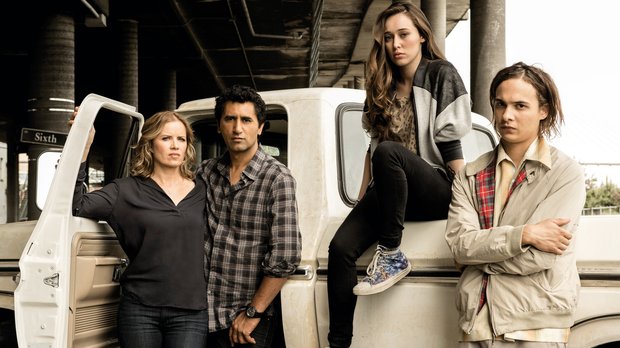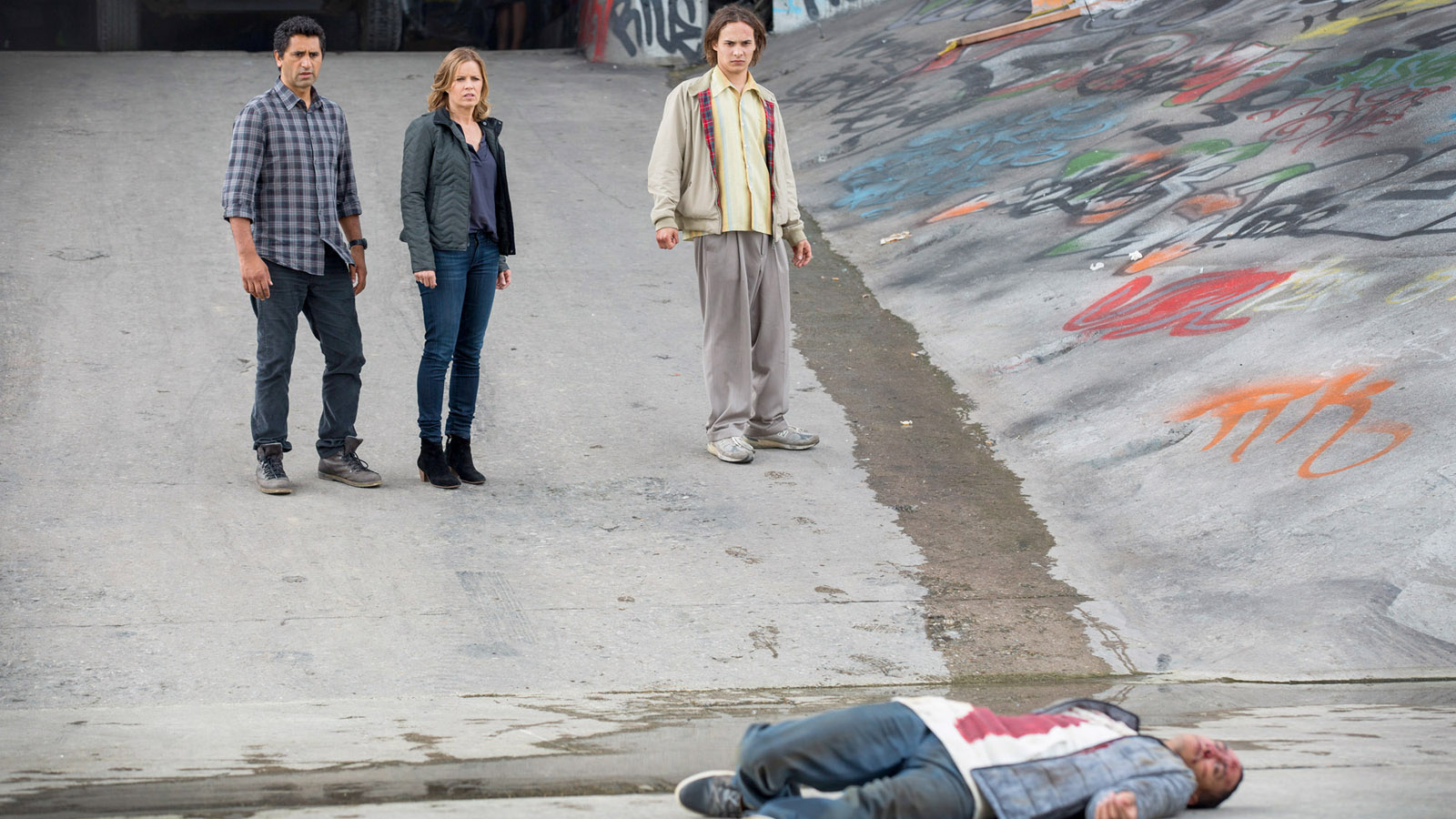For five seasons, The Walking Dead has terrified TV viewers with creator Robert Kirkman’s nightmarish vision of a zombie apocalypse, showcasing the savagery of both mankind and its horrific undead offspring. But beyond horror there lies something worse… Fear. The brainchild of Kirkman and showrunner Dave Erickson, Fear The Walking Dead explores the early days of the zombie virus outbreak, which led to the decimated landscape explored by its parent show and starts on 23 August. Centred this time in a city, Los Angeles, Fear follows one engaged couple, Madison (Kim Dickens) and Travis (Cliff Curtis), each a single parent, as they fight for a new life even as the world around them crumbles to pieces.

Erickson speaks with SFX from his LA office about how the first Walking Dead spin‑off series came to be… “I wrote the pilot based on an idea, a treatment that Robert wrote years ago, which was how we first met,” says the executive producer, who’s just returned from the show’s set in Vancouver. “I found him to be an incredibly great collaborator. When he first called me about Fear, we sat down and broke the pilot and talked about season one.”
Erickson describes Fear The Walking Dead as more steeped in psychological horror than the series from which it sprang. “When Robert and I first sat down and started talking about this, it was in the context of, in terms of chronology and timeline, this period when Rick Grimes was in his coma. So loosely speaking our story starts around the same time Rick was shot and what we’re really doing is exploring the few weeks from the beginning of the outbreak until it really starts to reach critical mass. It’s very much a slow burn. It’s very much about what you don’t see in the first few episodes. Something is wrong. There’s paranoia. There’s anxiety. There’s tension. One of our family members sees something in the beginning of the show, but doesn’t know if he’s losing his mind. He doesn’t know if it’s something he ingested. He’s trying to wrap his brain around what he saw, and what he saw is not of this world. There’s tension for our characters as they get up to speed and realise this virus, this whatever, is actually turning people. There’s also anticipation for the audience of course. I think everyone coming to this show knows the genre and definitely knows The Walking Dead, and it’s partly playing with the anxiety and the worry of ‘When are these characters going to catch up? When are they gonna start to realise what this really is? And will they realise too late?’”
The showrunner insists that while Fear The Walking Dead will offer the social allegory that walks hand in hand with tales of paranoia, the show is first and foremost a family drama. “We really tend to spend the bulk of our first episode and then into our second episode dealing with the problems that go with trying to build a new family. Travis has just moved in recently. He’s divorced, he’s got a very resentful, angry teenage son. Then Madison has a son and a daughter, a son who has some significant problems and a daughter who is quite driven and independent and has plans for the future. And it’s very much about these two people – Travis and Madison – who do love each other. In our minds, it was and should be a very strong relationship. What’s interesting is, as things begin to accelerate and as they begin to realise the world is changing, the attributes that they see in each other, that they love in each other, start to change a little bit. It becomes a real challenge to their relationship. The attributes of goodness and nobility and all the things we really appreciate in people in normal times, they can start to compromise you when you live in the zombie apocalypse. So they will start to see each other in different ways and they will do things they never thought they could do before. It will be an interesting process in that relationship, seeing how they can reconcile the person they love with the circumstances at hand.”
Those circumstances prove even more challenging for the protagonists of Fear The Walking Dead than those of The Walking Dead, since, unlike Rick Grimes, neither Travis nor Madison is a policeman trained to handle crises. “Travis is an English Lit teacher in high school, Madison is a guidance counsellor at the same school,” explains Erickson. “That’s how they met. We really don’t have any characters in the beginning of our show who are at all prepared for this. They don’t have the life skills. They don’t have the things that Rick and Shane had in their toolkit when the world ended. That’s actually something that will become very interesting, because we won’t really get to this point probably until season two, when it really comes down to survival, when it comes down to having to find food, having to find water, having to find shelter; the things that you need to survive. Then having to defend those things. They’ve never been trained for that. We’ll be dealing much, much more with this fish-out-of-water sensibility. That’s not to say that Rick and Shane weren’t also dealing with a completely new world, but they did have some tools that our characters don’t. Which I think will be fun for the audience to watch.”

Fear is further distinguished from The Walking Dead by virtue of the fact that it is not, at least in its early episodes, a story that takes place on the road. “We’re not really road-tripping it,” confirms Erickson. “That’s something we’ll eventually get to, but we really wanted to stay in our city and be able to explore it as much as we could. We didn’t want to abandon Los Angeles too quickly. A big part of the show is about the disintegration of society as seen through the disintegration of this family. But we do want to show the gradual fall of a major city. There were thematic and creative reasons for choosing Los Angeles, but we also wanted something that was distinctive, and distinctly not rural Georgia. To live in an urban setting for the bulk of the show was something that was different and distinct from the other show.”
Since Fear The Walking Dead takes place in the early days of the outbreak, Erickson says we can expect to see a different breed of walker than those that have come to infest The Walking Dead.“I think Amy [in season one] was probably the best example from the original show of a partially turned walker… Some of our characters will meet violent ends. So they may bear wounds, they may be bloodied up. But for the most part, our walkers will have their distinctive look but they definitely do not have the monstrous features that the atrophied, rotting walkers have on the original show.
Get sneak previews, exclusive competitions and details of special events each month!
“What was important to Robert when we first sat down was that as difficult as they are physically to kill, emotionally and psychologically there’s a trauma to it as well. What I find interesting is that when confronted by a family member, a friend, a colleague, somebody you had coffee with the day before and they’re attacking you, your instinct is not gonna be, ‘Okay, this person’s dead.’ It’s gonna be, ‘This person is sick. This person’s on something.’ You want to defend yourself, but you also want to help. You want to take care of these people. Slowly what we did is just introduce the realisation that these people are gone. So when you have to actually do violence to protect yourself, it’s a lot of weight. Especially if it’s somebody you knew. That became something interesting to explore. What would really happen if you had to put down somebody who you cared about? Not fully knowing what this is, not knowing if there is some miracle cure that’s gonna come along in the next few days. Not knowing if in a week somebody’s gonna say, ‘You know that guy you killed? We’re gonna take you away.’

“This is a whole new world,” adds Erickson. “The opportunity to explore the fall and to see the pieces, to see the city coming down and our family fractured, it allows us to explore some parts of the world, part of this mythology Robert created, in a different way.”
Fear The Walking Dead airs on AMC in the US on Sundays, and on AMC (exclusive to BT) in the UK from Monday 31 August.
Click here for more excellent SFX articles. Or maybe you want to take advantage of some great offers on magazine subscriptions? You can find them here.
SFX Magazine is the world's number one sci-fi, fantasy, and horror magazine published by Future PLC. Established in 1995, SFX Magazine prides itself on writing for its fans, welcoming geeks, collectors, and aficionados into its readership for over 25 years. Covering films, TV shows, books, comics, games, merch, and more, SFX Magazine is published every month. If you love it, chances are we do too and you'll find it in SFX.


